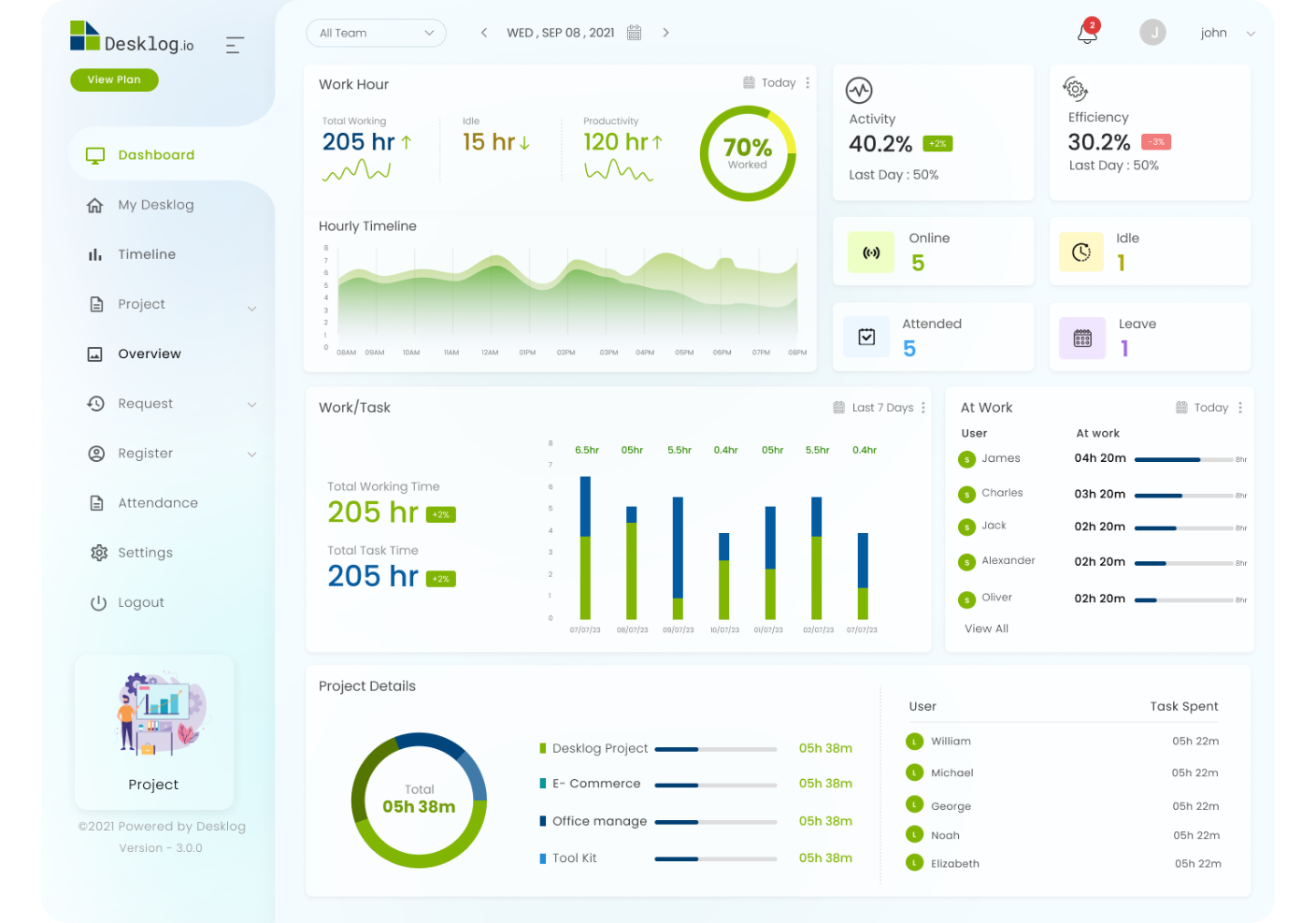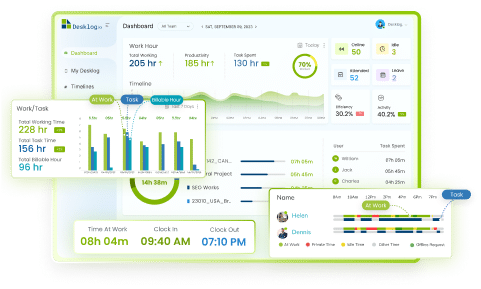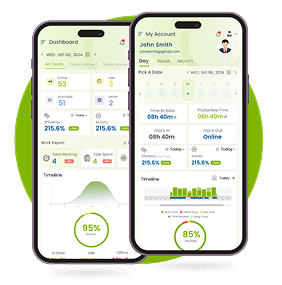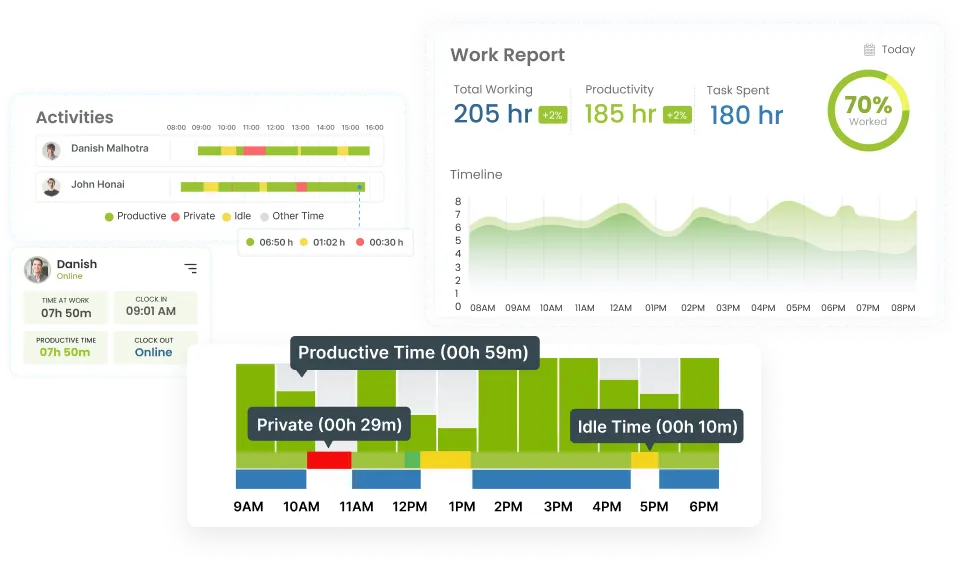On Premise VS Cloud Based Time Tracking Software
Time tracking has become an essential element for organizations of all kinds. The transparency, accountability, and productivity boost provided by time tracking software are too good to ignore for any company.
There are a lot of options available for you to monitor the time and activities of your employees. People are often torn between choosing a cloud-based or white label on-premise solution for their time tracking requirements.
Desklog is an automated time tracking software with advanced features that provides you with on-premise and cloud-based implementation options. Here we will look at how these two methods compare against each other and what is best for you.
On-Premise vs Cloud time tracking
It’s no wonder that cloud computing has exploded in popularity since it is more flexible and promises businesses more freedom in everything from time and money savings to increased scalability. On the other hand, on-premise software, which is implemented on a company’s own servers and protected by a firewall, is sufficient for most corporate needs. Furthermore, on-premise apps are dependable, secure, and allow businesses to maintain a level of control that is difficult to achieve in cloud solutions.
Desklog On-Premise Time Tracking Software
Whether a company implements its time tracking software on the cloud or on-premise, data security will always be essential. But for businesses in highly regulated industries, the decision might already be made for them to choose an on-premise alternative. And keeping all your data located within your in-house servers and infrastructure always provides more security.
On-premise environments have the disadvantage that the expenses of administering and maintaining all of the solutions might be greater than in a cloud alternative. In-house server equipment, software licensing, integrations, and IT employees on hand to help and manage potential issues are all required for an on-premise system. Maintenance costs should also be considered.
Desklog’s on-premise white-label alternative comes with all the features of the cloud version plus the safety and security of self-hosting. This is perfect for businesses that want to have more control over their data. The device is compliant with all government and industry laws, and the installation process is quick and straightforward.
Want to try our Time Tracking Software?
Try Desklog for free!

Desklog Cloud-based Time Tracking Software
In an on-premise environment, a company hosts evDesklog Cloud-based Time Tracking Software erything in-house, but in a cloud environment, a third-party host’s everything for you. This enables businesses to pay as they go and effectively scale up or down based on overall consumption, user requirements, and the company’s growth.
There are no upfront costs, data may be backed up regularly, and businesses only pay for the services they use. The cloud version has even more appeal for international companies because it allows you to manage customers, partners, and other enterprises from anywhere with minimal effort.The cloud version of Desklog can also be implemented immediately. Instant implementation eliminates the time spent on installation and configuration, allowing customers to execute the software immediately.
What are the Differences?
Implementation
On-Premise: Resources are deployed in-house and within an enterprise’s IT infrastructure in an on-premise structure. The software, as well as all related processes, and data are controlled by the enterprise.
Cloud computing: In cloud computing, resources are hosted on the premises of the service provider, but businesses can access and utilize them whenever they choose.
Control
On-Premise: Companies keep all of their data on-premise and have complete control over what happens to it. Because of this, companies in highly regulated industries with significant privacy issues are more likely to choose on-premise alternatives over cloud versions.
Cloud: Many firms and users are divided on the issue of data ownership. Because data and encryption keys are stored by a third-party provider, you may be unable to access that data if the unexpected occurs and there could be downtime.
Security
On-Premise: Companies that handle highly sensitive data, such as those in the government and finance, require the safety and confidentiality that an on-premises system provides. Despite the cloud’s potential, security is a top priority for many companies, so an on-premise infrastructure makes more sense.
Cloud Computing: Security concerns remain the most serious obstacle to cloud-based time tracking software adoption. There have been a bunch of high-profile cloud security breaches, and IT departments all across the world are worried. The security threats are real, going from the personal information of workers including login credentials to the loss of intellectual property.
A comparison: On-Premise vs Cloud
| On-Premise | Cloud |
|---|---|
| Fewer chances of downtime | No need to worry about infrastructure |
| Complete control over data | Accessible from anywhere |
| Total lifetime cost could be less | Instant implementation |
| White label and highly customizable | Possibility of connectivity problems |
| Increased security | High scalability |
| Higher initial cost | Low energy costs |
| Maintenance responsibility | Long term costs could be higher |
| Implementation may take time | Fewer customization options |
Winding-up
There are some key differences between on-premise and cloud-based Desklog time tracking software. Which approach is best for your organization is entirely dependent on your requirements and what you’re looking for in a solution. Check out Desklog’s on-premise and cloud versions before you make a decision.
















